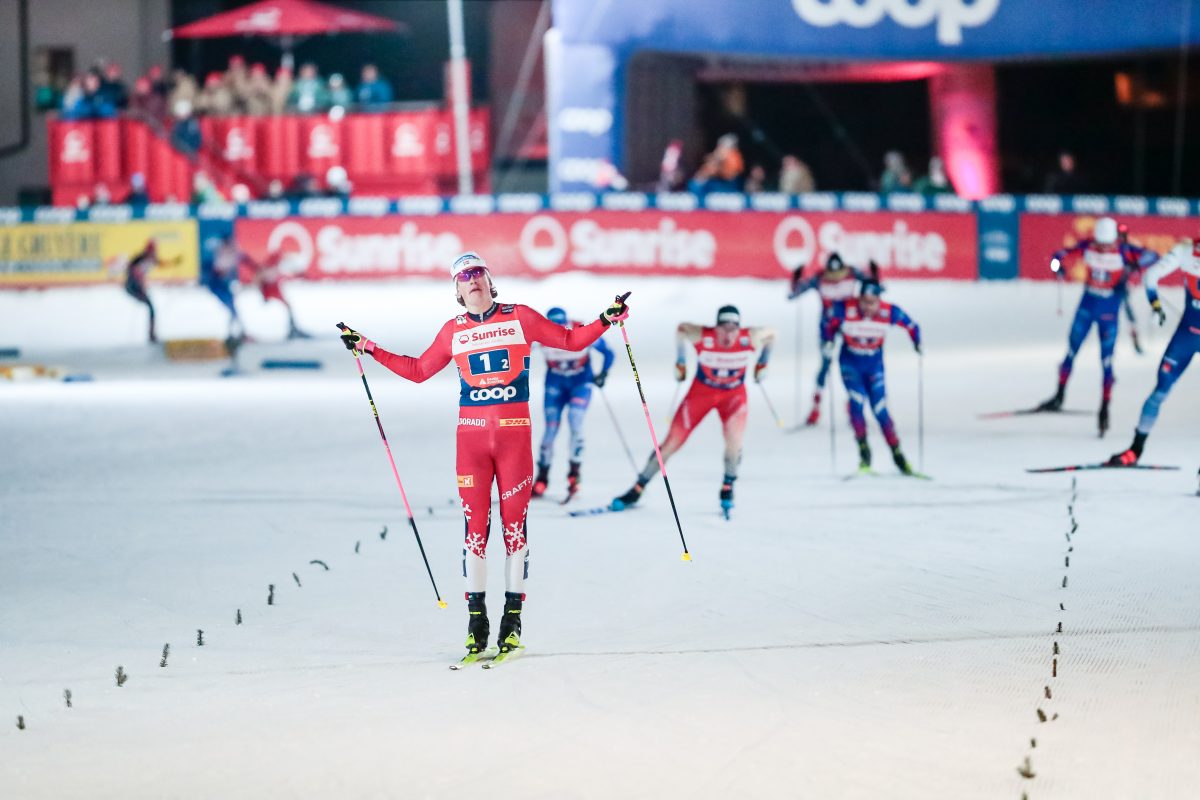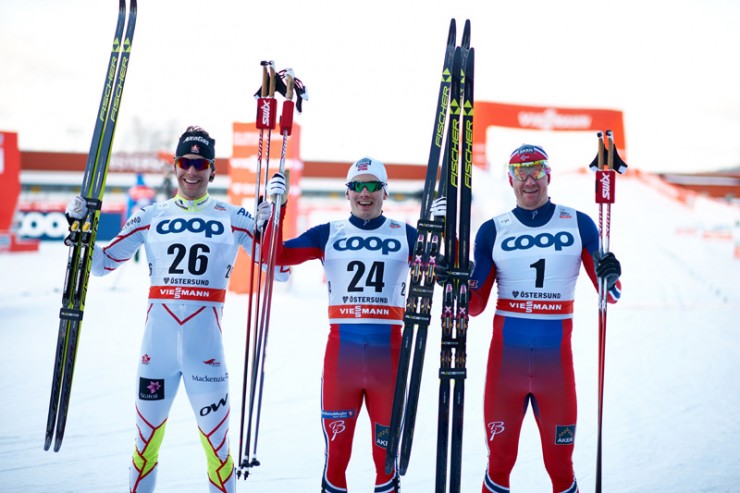
FasterSkier’s coverage of the 2015 FIS Nordic World Ski Championships in Falun, Sweden, is brought to you by the generous support of L.L. Bean, now featuring a complete line of Kikkan Randall training wear.
Cross Country Canada announced its 2015 Nordic World Ski Championships team Feb. 9, and surprised many by selecting the smallest championship team in recent years. Led by World Cup Team members Alex Harvey, Devon Kershaw, Ivan Babikov, and Len Valjas the squad features nine athletes, including Jess Cockney (AWCA/NST-Dev.B), Graeme Killick (AWCA/NST-Dev.B), Perianne Jones (AWCA/NST-Dev.), Emily Nishikawa (AWCA/NST-Dev.), and U23 standout Olivia Bouffard-Nesbitt (Rocky Mountain Racers).
FasterSkier discussed the nine athletes and their chances at worlds with Canadian National Team Head Coach Justin Wadsworth following the announcement.
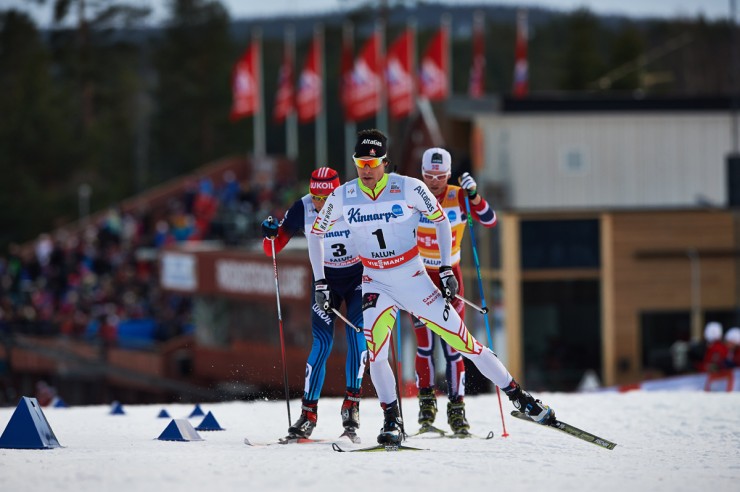
FasterSkier: Tell us about the 2015 Canadian World Championships Team. What are its strengths?
Justin Wadsworth: “It’s a very accomplished team that has a lot of experience. You obviously have some skiers who have placed second and third place in the men’s overall World Cup with Devon [Kershaw] and Alex [Harvey] and there’s multiple medals with Lenny [Valjas] and stage World Cup podiums from Ivan [Babikov]. Those are the four key players of the team. It’s a very experienced team.
“On the women’s side, Perianne [Jones] has gotten a medal on the World Cup before and Emily [Nishikawa] is not quite at the medal level, but she’s been quite consistent this year. Then we have Olivia [Bouffard-Nesbit] coming from U23s, who were are really excited about. We’re really happy to give her the opportunity to race well in Falun.”
FS: This year the team is smaller compared to more recent championships (Canada brought 12 to worlds in 2013). Why such a small team?
JW: “We do have standards for both the men’s and women’s programs. I’d love to take more men and more women, but we have the standards that we feel like the athletes need to meet. We’ve decided that the World Championships is not a developmental tool. If we compare ourselves to the U.S. you also [have to consider] they have a deeper program and are a bit stronger. I would argue that comes from a stronger club and university program that feeds up to the national team, not because they’ve taken more athletes to World Championships or Olympics in the past.”
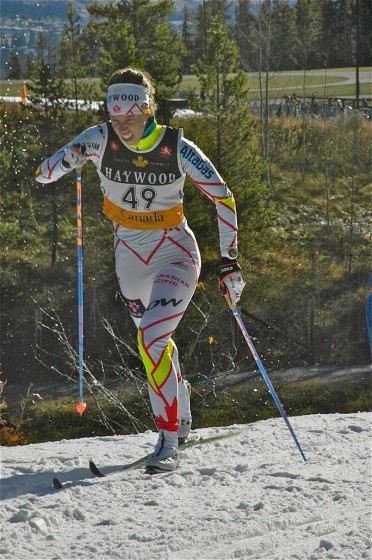
FS: Why didn’t the women meet those standards you were looking for in World Championships athletes?
JW: “We have a standard on the World Cup of being close or scoring points – basically good international racing at the World Cup level. We just haven’t seen that from any of our other ladies. We did set a standard of the top-12 for the U23s, and I really did want to take more U23s women to the Championships. We had one woman step up to the plate and perform really well. That was the standard that needed to be met just like the men. The reason we set the standard is that we don’t view the World Championships as development. We look specifically to medal at World Championships.
“We feel like if our team size exceeds and grows beyond that, these women aren’t going to be sitting in the top-40, then we put more stress on our wax team and staff and that decreases the chance of a medal. I would point to the U.S., and maybe our team also, when you’re trying to service 12 to 15 people with a small wax team things can happen and you can make mistakes. We saw no medals from either program at the Sochi Olympics. We really feel strongly about giving a chance to athletes who are at the standard.”
FS: Was there any talk of adding a fourth women so the team could field a relay?
JW: Yeah, we really wanted to do that. We were hoping the results would be better in the earlier World Cups and U23s but no one really met the criteria. If someone really performs amazingly on the Scandinavian tour we could bring someone in for that event.
FS: What would it take for someone to be chosen as the fourth women’s team member?
JW: “We look at it objectively because you never know the field is in these races. We can’t say ‘oh if they’re top-five or top-10.’ We look at the field size, the competition, the time back and make our decision from there.”
FS: Apart from the three athletes who met objective criteria (Harvey, Kershaw, and Babikov), how was the team chosen?
JW: “We tried to get away from domestic trials and put more emphasis on international results. We looked at any World Cup results or U23 or Junior World results. The next notch down was looking at domestic results, in case somebody was really just killing it domestically on a consistent basis and wasn’t getting an international start.
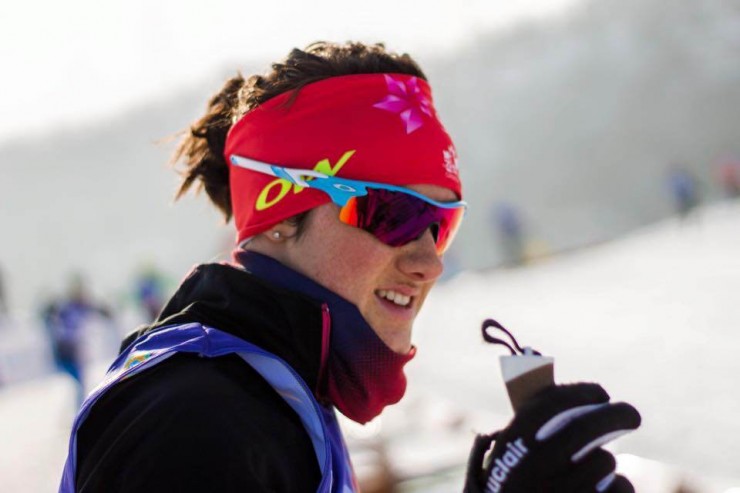
FS: Oliva Bouffard-Nesbit hasn’t had any World Cup or World Championships experience. What do you want to see from her in Falun?
JW: “I spoke with Olivia and I told her that our main goal for her is to get some good racing at the World Cup and World Championships level, more than anything for experience. She traveled over to Kazakstan and and performed well. I don’t want to put any more pressure on her with any ‘you need to be top-50’ or whatever… I just want her to be focused, relaxed, and enjoy the experience and I know she’ll race her heart out. Coming out of that I hope she is motivated and learns from her teammates and gets some experience that she can take with her in the future for her ski career.”
FS: What do you want to see from the team as a whole?
JW: “We really want to see medals. We’ve only had one podium up to this point in the year [Harvey has since earned the second podium in the Östersund classic sprint]. Alex is really capable of getting a podium – he’s done it in the last two World Championships. Devon, Ivan, and Len have all proven they can do it in the past. They haven’t had the greatest year up to this point but they’ve been improving steadily. Ivan had some really good glimmers of racing, as did Devon. Their chances are as good as any. I want those guys to give it their all, be professional, and be good teammates. What falls will fall. I’m not making any medal predictions, we just want strong performances.”
FS: What events are the team’s best chances at a top performance?
JW: “In every race we have good opportunity. It is just putting it together on the right day. I consider the team strong in the skiathlon, the sprint, and the 50 k. Those are our three best chances at a medal opportunity and the other races we can be strong in but I’m not going to make any predictions.”
Lander Karath
Lander Karath is FasterSkier's Associate Editor from Bozeman, Montana and a Bridger Ski Foundation alumnus. Between his studies at Middlebury College in Vermont, he is an outdoor enthusiast and a political junkie.

